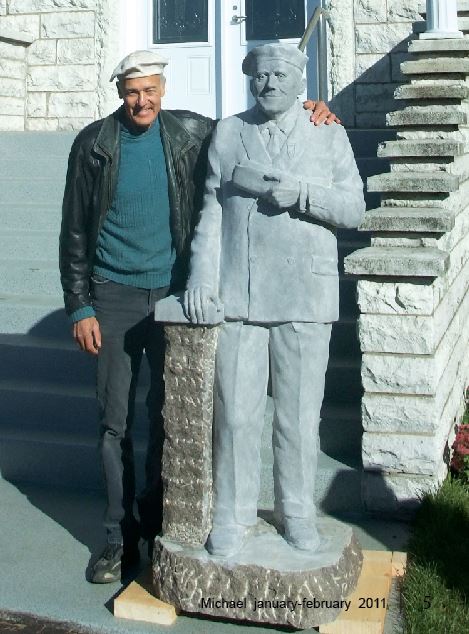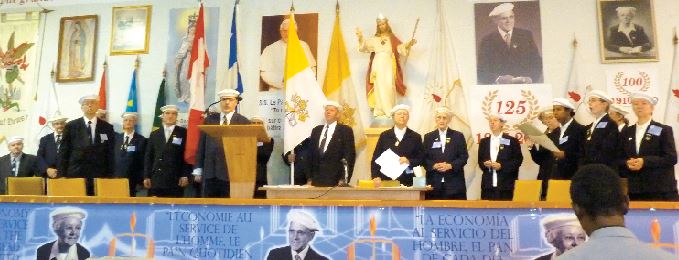
The economic problem of our ancestors, who had at their disposal only human labour, animal strength and a few simple tools, was to produce enough to sustain themselves. Real poverty was a constant threat. In the twentieth century, with nature and applied science at our disposal, the immediate problem is to find the way to distribute the available abundant production. The actuality of abundance, realized or realizable, should confer on all Canadians the following political rights in the economic sphere:
The U.S. Declaration of Independence mentions these famous unalienable rights: life, liberty and the pursuit of happiness. Life is the right for each individual to be able to obtain the necessities of life, food, clothing, lodging, without having to resort to public charity. Liberty is the right for each individual to choose the kind of occupation which he is best suited for, instead of being compelled to accept such work as he can find. Pursuit of happiness is the right for each individual to leisure which he would be free to use in accordance with his personal initiative for material, aesthetic, intellectual or spiritual activities.
The possibility of guaranteeing these rights rests on today’s undeniable possibility of producing all the necessary things for the fulfilment of every person while using only a fraction of available human labour.
|
|
Social Credit is a philosophy whose goal is to allow the consumer to benefit from the full productive capacity of the nation. Unemployment, from which people suffer today, is not the result of the saturation of the consumers’ needs or of the exhaustion of products and services; it results from the lack of distribution of products and services.
Production goes forward in accordance with the orders it receives. These orders are conditioned by the purchasing power of the consumers and this purchasing power depends on how much money is in the hands of consumers.
Social Credit presents a scientific formula which would always compensate for the gap which exists between the prices of products offered to consumers and money in the hands of the consumers who want the finished products. It therefore does not admit to either inflation or deflation but automatically maintains equilibrium between the price of production and purchasing power. It subdues money and puts it to the service of man. It compels it to fulfill its function; which is the selling of production and the satisfaction of the consumer as far as natural and industrial resources permit.
As well as maintaining this equilibrium, Social Credit includes the abolition of poverty, which is the social guarantee of the individual’s economic security.
No-one will deny that Canada (or any other country) is easily able to produce enough goods to provide an honest subsistence to each and everyone. The physical possibilities exist; only the financial possibility is lacking. It is finance that does not serve Canadians, so this is where one must find a remedy. As Henry Ford remarked, the products are there but the money is lacking. The producers of goods fulfill their role but the producers of dollars fail to carry out theirs. There is an admirable technique in production but there is none in the monetary system. Henry Ford, the great American industrialist, said this system as outdated and ineffective and it is high time we changed it.
Money is not wealth; it is only the title to wealth. Wealth comes from human or mechanical labour applied to natural resources. Wealth is not lacking in Canada but it could be much more abundant since there is much human and mechanical labour that is not currently being utilised. Money comes from manufacturers of money and because there is a shortage of it, the titles to wealth are lacking. If wealth is not sold, production stops and poverty reigns amid plenty.
Money is composed of metallic pieces, bank notes, and credits or bank deposits put into circulation by cheques. Today cheques account for more than 95 per cent of business transactions. Cheques simply shift credits in bank ledgers. Deposits in banks therefore form the most substantial part of money in circulation. These deposits originate through credits granted by the banks in the form of loans, discounts, overdrafts or bond purchases. Banks are the creators of money but they cancel this money by recalling loans and reducing overdrafts. If the creation of money proceeds faster than its cancellation, the amount of money in circulation increases; if cancellation advances faster than creation, the money supply decreases. There is no equilibrium between production and money because the banks do not seek a balance but only their particular profit.
Moreover, advances are made to finance production but the flow of money from the productive system does not match the rate of the creation of prices for products. It is impossible for anyone, however well-intentioned, to manage the present monetary system to accord with the needs of the public and productive capacity to satisfy those needs.
The nationalization of banks would not by itself correct anything. Changing those who control it is insufficient; one must change the policy which governs this control. In other words, it is necessary that control pursues another end; that it looks for a constant equilibrium between prices and purchasing power.
 Picture: On October 4, 2010, Mr. Robert Roy, a very talented sculptor and long-standing Social Crediter of St. Jean Port Joli, Quebec, came to Rougemont to bring his latest work: a life-size stone statue of our founder, Louis Even. Picture: On October 4, 2010, Mr. Robert Roy, a very talented sculptor and long-standing Social Crediter of St. Jean Port Joli, Quebec, came to Rougemont to bring his latest work: a life-size stone statue of our founder, Louis Even. |
Money can be controlled socially, in accordance with the facts of production and consumption of the country but only at a national level and in accordance with a national accounting service. It is absolutely necessary to have a national monetary authority just as we have a judicial authority to administer justice.
Private banks can continue their operations with a view to profit in return for services rendered but must no longer have the right to increase or reduce the money supply. This function must exclusively be relegated by the national monetary body, the National Credit Office.
The National Credit Office monitors the statistics of production and consumption and acts accordingly, issuing money so as to ensure that all production can be sold so long as it accords with the needs. It exercises all necessary powers for reaching this objective, for which it is responsible to the nation.
The proposed technique to reach the dual objectives of Social Credit – equilibrium between prices and purchasing power, and the abolition of poverty – consists of two methods for the country to distribute new money; the compensated discount and the dividend.
The compensated discount is meant to balance prices and purchasing power by creating and distributing money without inflation. Money from the compensated discount finances a reduction of the price in favour of the consumer.
If available production is 12 billion and the purchasing power is only 9 billion, the National Credit Office decrees a 25 per cent reduction on all prices, a discount on all products at the time of sale to the ultimate consumer. That is to reduce prices to the level of the purchasing power. The discount is compensated to the retailer, meaning the Credit Office repays him the money that he sacrificed by the discount. This new money is created by the Credit Office exactly in the same manner as today’s bank money. It favours the consumer provided he buys products; it goes to the retailer provided he sells products. It sells production by lowering prices and satisfies everyone; the buyer, the retailer and the producer who is only too pleased to sell his production.
The national dividend, as the name implies, is the distribution of a dividend; the sum of money representing a surplus or the revenue from capital to all members of society – therefore to each man, woman and child in Canada (or any other country).
This dividend is based on the existence of the cultural heritage or social capital belonging to each person, capital consisting in the discoveries and the inventions of science. The part this capital is playing in production becomes greater, while the part of human labour becomes smaller. We are all heirs to the accumulation of past generations. We are all capitalists and we have the right to a sufficient dividend to shield us from poverty.
In order to understand the possibility of the application of the monetary system advocated by Social Credit, one must not lose sight of the fact that the world has entered into the era of abundance. If there is poverty, it is not because there is wealthy people but because the abundance is not distributed. Therefore there is no need to take away from the rich to give to the poor; we just have to put some technique into the monetary system. We cannot content ourselves with saying that money is made for man; but we must work to establish a system that is at the service of man; of all men.
 Opening of our Congress in Rougemont, Sept. 3: our team of full-time Pilgrims. Opening of our Congress in Rougemont, Sept. 3: our team of full-time Pilgrims. |